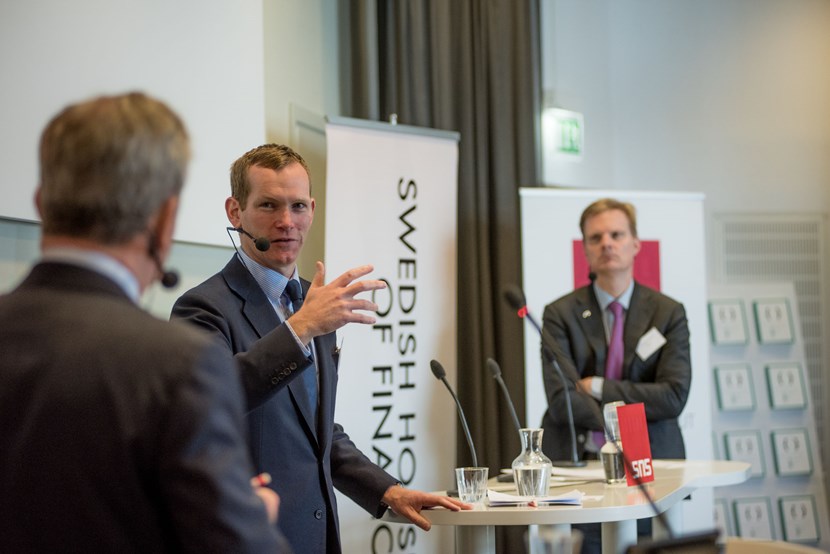“Sweden has to assert itself more in the EU”
maj. 15, 2017
The timetable is set. But the transition period into a new set of frameworks for cooperation between the UK and the EU is causing nervousness, both in London’s financial district and in Sweden.

Jeremy Browne, City of London’s Special Representative to the EU, visited the SNS / SHoF Finanspanel on 4 May to discuss the latest developments of Brexit and its implications for Sweden. Joining him was Jens Henriksson, CEO of Folksam and an audience with a lot of questions.
Jeremy Browne started by giving a short introduction to the process and where we are now. During the past year, he visited all EU states, to discuss the future relationship between EU and Britain and he reported of quite a lot of optimism that a mutually beneficial trade relationship would replace the existing EU membership.
Right now, it is the transition period starting with the official exit in March 2019 and lasting until we have a new functioning agreement in place that is causing some nervousness for businesses and of course also the financial services industry. There doesn’t need to be a final agreement in place but if there is a framework in place in March 2019, it would be much easier for many businesses that need to plan ahead.
– I hope that this discussion need not be as difficult as some trade negotiations. We have all the same standards already so the question is not how to harmonize but how to manage future divergences and how much politicians wish to introduce an element of dysfunctionality for wider political purposes, said Jeremy Browne.
“Resisting change is not a formula to success”
For London as a financial center, the effects of Brexit will be hard to disentangle from an ever-ongoing evolvement of the industry. Main concerns for businesses are market access, the transitional arrangements and future access to talent. Jeremy Browne believed there is a risk that it will be more complicated for some categories, for instance entrepreneurs, wanting to go to London to network and launch new businesses in the future.
– I believe that the European economy will keep London as its financial center and any attempt by the EU to replace London would be an act of self-harm by the EU since London is an asset for Europe as a whole, said Jeremy Browne.
As Britain leaves, Sweden loses one of our best friends in the EU. Jeremy Browne argued that Sweden has to become more assertive within the EU once Britain leaves.
– It felt personal when Britain decided to leave and we are losing a close ally in the EU. Sweden will now be weaker. We have shared a lot of ideas and similarities and will now have to find other liberal forces to work with, said Jens Henriksson.
For the financial sector, a lot of uncertainties are in the detail of things. Both Jeremy Browne and Jens Henriksson agreed that we can be sure that there will be set backs and it is important to maintain a good relationship to be able to handle those complications along the way. The supervision of banks is one area that needs to be dealt with and to find a long-term solution it is important to keep Britain and the Bank of England at the table. One idea that was discussed was to give increased power to ESMA and set up cooperation with other relevant authorities in the EU and Britain.
– There will be a lot of changes in the financial services sector in London in the years to come. A lot of those changes will, wrongly, be attributed to Brexit as they might have happened anyway. Resisting change is not a formula to future success and London will keep evolving, said Jeremy Browne.
